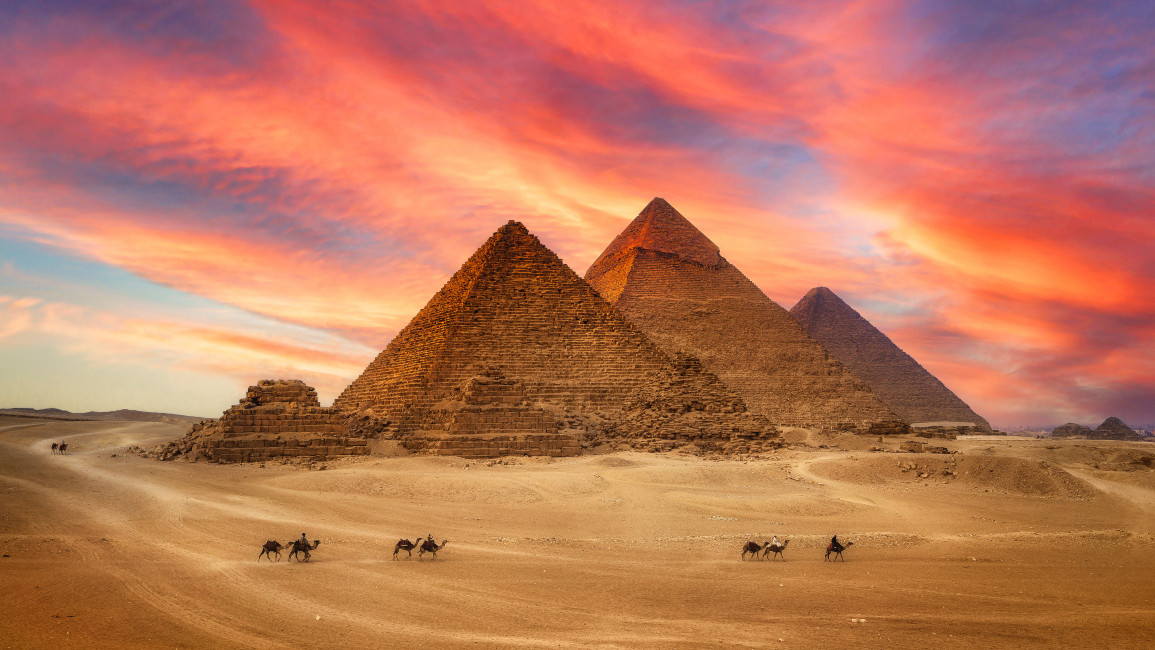'Egypt's gift to the world': Experts divided over restoration plan for Giza's Menkaure Pyramid
A long-term restoration project of Menkaure Pyramid, the smallest of Egypt's over 4000-old three pyramids of Giza, to its original state, has divided experts over the past few days.
Dubbed the "project of the century" by Mostafa Waziri, the Secretary-General of the country's Supreme Council of Antiquities, in a video posted on his Facebook page on Friday, 26 January, in which he talked about how the pyramid lost its original granite casting over the centuries and declared that it is expected to take a joint Egyptian-Japanese archaeological mission three years to restore the granite blocks of the outer surface of the Menkarue pyramid dating back to 2,150 BC.
Japan fully funds the project.
Waziri further described the plan as "a gift from Egypt to the world…that will not cost Egypt a penny," coinciding with the inauguration of the nearby Grand Egyptian Museum, due to open later this year after about 20 years of construction work.
According to Waziri, there are about 124 pyramids in the country, but the only one known to have been built with an outer cast of granite blocks is King Menkaure's. The pyramid lost its original granite casting over the past centuries.
However, the ambitious plan sparked a heated debate among experts.
High-profile archaeology professor Monica Hanna slammed the plan for being "impossible" as she strongly opposed the project for being a form of "flooring" the ancient pyramid.
"When shall we stop the absurdity of handling Egyptian heritage?" Hanna rhetorically asked in a post on X, formerly known as Twitter.
مش ممكن، فعلاً اللي ناقص ترميم الاثار هو تبليط هرم منقاورع، هو العبث بأثار مصر مش هينتهي؟
— Monica Hanna (@monznomad) January 26, 2024
كل المواثيق الدولية في الترميم بترفض هذا التدخل بكل اشكاله، اتمنى من كل اساتذة الجامعات في الاثار والترميم الوقوف ضد هذا المشروع بشكل فوري… https://t.co/rDYOEFRpvB
"All international renovation principles prohibit such interventions," she added, calling on her fellow archaeologists to immediately mobilise against the project.
But prominent historian and author Bassam El-Shamaa begs to differ, describing the project as "the jigsaw puzzle of all times."
"The usage of the word 'flooring' by an internationally recognised expert is out of context," Shamaa remarked to The New Arab in reference to Hanna.
"I believe the project is a positive step as it will involve no external additions. Rather, the dislocated bricks will go through counting, laser scan, and photogrammetry for the mission to decide where every single part will be placed," he explained.
"Ancient Egyptians installed granite over limestone bricks to preserve them from environmental factors. Reinstalling the fallen granite around the pyramid restores it to its original state," Shamaa argued.
Renowned Egyptologist Salima Ikram maintained a more balanced position.
"Documenting the fallen blocks and the pyramid itself seems like a very good idea. Should anastylosis be carried out? This question has vexed conservators, scholars, and the public," she wrote on her Facebook page.
"Perhaps yes to anastylosis, but no to any additional new blocks? Ideas about restoration and conservation change a great deal, and what was thought to be great when it was done is often criticised ten years later…It is worth remembering that many ancient Egyptian monuments were restored even in antiquity," she added.
Meanwhile, as the debate continues, former minister of antiquities and prominent Egyptologist Zahi Hawass has been tasked with leading an official committee to decide the project's fate within the coming days.



